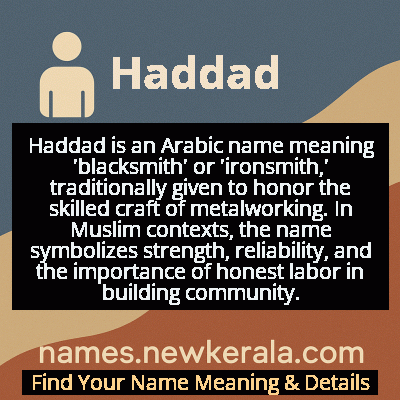Haddad Name Meaning & Details
Origin, Popularity, Numerology Analysis & Name Meaning of Haddad
Discover the origin, meaning, and cultural significance of the name HADDAD. Delve into its historical roots and explore the lasting impact it has had on communities and traditions.
Name
Haddad
Gender
Male
Origin
Muslim
Lucky Number
4
Meaning of the Name - Haddad
Haddad is an Arabic name meaning 'blacksmith' or 'ironsmith,' traditionally given to honor the skilled craft of metalworking. In Muslim contexts, the name symbolizes strength, reliability, and the importance of honest labor in building community.
Haddad - Complete Numerology Analysis
Your Numerology Number
Based on Pythagorean Numerology System
Ruling Planet
Uranus (Rahu)
Positive Nature
Strong sense of order, loyal, practical, and disciplined.
Negative Traits
Stubborn, overly serious, rigid, and prone to feeling restricted.
Lucky Colours
Blue, gray.
Lucky Days
Saturday.
Lucky Stones
Blue sapphire.
Harmony Numbers
1, 7, 8.
Best Suited Professions
Managers, engineers, accountants, organizers.
What People Like About You
Dependability, discipline, practicality.
Famous People Named Haddad
Nicolas Haddad
Diplomat
Lebanese ambassador to multiple countries and prominent Arab nationalist figure
Rashid Haddad
Poet
Influential Lebanese poet known for modern Arabic poetry and literary contributions
Yusuf Haddad
Military Leader
Prominent Lebanese military figure during the civil war period
Samir Haddad
Physician
Renowned cardiac surgeon and medical researcher in the Middle East
Name Variations & International Equivalents
Click on blue names to explore their detailed meanings. Gray names with will be available soon.
Cultural & Historical Significance
The name is particularly common among Christian and Muslim communities in Lebanon, Syria, Palestine, and throughout the Levant. In Islamic tradition, craftsmanship is highly valued, and the profession of blacksmithing is mentioned in various historical and religious contexts. The name symbolizes the importance of honest labor and the dignity of working with one's hands. Many prominent families bearing this name have contributed significantly to business, politics, and arts in the Arab world, maintaining the name's association with resilience and foundational strength.
Extended Personality Analysis
Individuals named Haddad are often perceived as strong, reliable, and practical people with a grounded approach to life. They tend to exhibit the characteristics traditionally associated with blacksmiths: resilience under pressure, the ability to transform challenges into opportunities, and a methodical, hardworking nature. These individuals are typically seen as the backbone of their families and communities—dependable, straightforward, and possessing inner strength that others can rely upon during difficult times.
Their personality often combines traditional values with modern adaptability, showing both respect for heritage and willingness to evolve. Haddads are frequently described as having a 'forge-like' temperament—they may appear tough externally but possess a warm, protective nature toward those they care about. They tend to be problem-solvers who approach difficulties with patience and determination, much like a blacksmith patiently working metal into desired forms. This combination of strength, reliability, and practical wisdom makes them natural leaders and trusted advisors in both personal and professional contexts.
Modern Usage & Popularity
In contemporary times, Haddad remains a popular surname throughout the Arab world and has increasingly been used as a first name, particularly among Muslim communities seeking to honor heritage and traditional values. The name has maintained steady usage in Lebanon, Syria, Jordan, and among diaspora communities in Europe, North America, and South America. While not among the most common first names, it carries a distinctive traditional appeal that resonates with families valuing craftsmanship, strength, and cultural continuity. In recent decades, the name has seen a modest revival as part of broader trends celebrating Arabic heritage and occupational names with deep historical roots.
Symbolic & Spiritual Meanings
Symbolically, Haddad represents transformation, strength, and foundational support. Like the blacksmith who transforms raw metal into useful tools, the name symbolizes the ability to shape one's destiny and overcome challenges through skill and perseverance. The forge and anvil metaphorically represent the trials that strengthen character, while the finished products symbolize the valuable contributions one makes to society. The name also carries connotations of protection (as blacksmiths created weapons for defense) and community service (as they produced essential tools for daily life). In a broader sense, Haddad symbolizes the human capacity to create order from chaos and beauty from raw materials, representing both practical wisdom and creative power.

